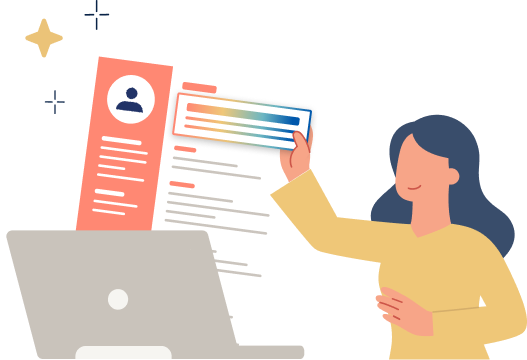Conflict Resolution Skills for Your Resume & Workplace

Our customers have been hired at: *Foot Note
AI Resume Skills Generator

Conflict resolution skills can foster a productive work environment, improve performance, strengthen relationships, retain employees and even save money.
But what are conflict resolution skills? Why do they matter?
Let’s see conflict resolution skills examples, how to demonstrate them in your resume and how to learn and improve this necessary skill to take your career to the next level.
What are conflict resolution skills?
Conflict resolution skills are managing and resolving disagreements or conflicts between individuals or groups. Conflict resolution is a core skill on its own and also a skill set part of the soft skills we use to work with others.
Conflict resolution is an invaluable asset as it maintains a productive and healthy environment in the workplace. Conflict resolution skills can be applied in a variety of contexts, from resolving disputes between colleagues to negotiating with clients or vendors. By developing and honing these skills, professionals can improve their ability to work effectively with others, build stronger relationships, and achieve better outcomes.
Key conflict resolution skills to include on a resume
Conflict resolution skills in the workplace are an important component of teamwork and leadership. While you can include conflict resolution as its own skill, you can also include other skills to highlight this ability, like:
- Active listening
- Communications
- Decision making
- Collaboration
- De-escalation
- Leadership
- Emotional intelligence
- Negotiation
- Empathy
- Problem-solving
- Cultural competence
These examples of conflict resolution skills can be used in your resume and cover letter to highlight the qualifications that make you a great candidate. While we tend to focus on the hard skills an employer uses in the job description, these interpersonal skills often set us apart from other candidates. According to the World Economic Forum’s The Future of Jobs Report 2023, “emerging technologies such as generative AI are reshaping workforce demands, and employers are placing greater emphasis on “soft” skills. These skills allow companies to respond to change and are resistant to automation.”
Showcasing conflict resolution skills with action verbs
Action verbs show what you can accomplish — and what you have accomplished! These words empower your resume accomplishments and highlight your relevant job experience — even if you write a resume with no experience.
The action words exemplify how you’ve used these conflict resolution skills on your resume’s work history and your cover letter.
- Mediated — Communicates you have successfully facilitated communication between conflicting parties to reach a mutually beneficial solution.
Example: Mediated a conflict between two team members to improve collaboration and productivity.
- Negotiated — Indicates you have experience finding common ground and reaching agreements through negotiation.
Example: Negotiated a contract with a vendor, resulting in a 20% cost reduction for the company.
- Collaborated — Conveys you have experience working effectively with others to resolve conflicts.
Example: Collaborated with a cross-functional team to address customer complaints and improve customer satisfaction ratings.
- Facilitated — Communicates you have experience guiding discussions and helping groups to reach consensus.
Example: Facilitated a team meeting to resolve a conflict around project timelines and priorities.
- Resolved — Indicates you have experience successfully addressing and resolving conflicts.
Example: Resolved a conflict with a client by addressing their concerns and proposing a solution that met their needs.
- De-escalated — Communicates you have experience calming down emotionally charged situations and preventing them from escalating.
Example: De-escalated a tense confrontation between two customers, resulting in a peaceful resolution.
- Mitigated - Indicates you have experience minimizing the negative impact of conflicts.
Example: Mitigated a conflict between two team members by identifying and addressing the root cause of the issue.
- Educated — Conveys you have experience teaching others conflict resolution skills and strategies.
Example: Educated new hires on conflict resolution techniques and defusing tense situations with customers.
- Empathized — Communicates that you have experience understanding and acknowledging the emotions of others during conflicts.
Example: Empathized with a customer upset about a delayed delivery, and worked with them to find a solution that met their needs.
- Advised — Indicates you have experience providing guidance and advice to others on approaching conflicts.
Example: Advised a team member on handling a conflict with a difficult colleague and provided them with strategies for effective communication and conflict resolution.Pro Tip: Use these action verbs during a job interview to empower your answers.
Make a resume with MyPerfectResume
Our Resume builder can help you write the perfect resume. Start Now!
Careers that require strong conflict resolution skills
Conflict resolution is a key skill in any career, though in different capacities. However, the careers and industries below require mastery of healthy conflict resolution skills to excel in their craft.
- Customer Service Representative
- Human Resources Manager
- Lawyer
- Law Enforcement
- Nursing
- Project Manager
- Safety and Security
- Social Worker
- Teacher
How to develop conflict resolution skills
Workplace conflict resolution skills can be learned. Add more tools to your skill set by exploring how to develop and improve your conflict resolution skills.
- Self-awareness: Before you start improving, you must take a genuine look at your emotions and triggers. Being aware of your own reactions and responses is the first step to developing conflict resolution skills.
- Seek feedback: Once you figure out your own understanding, ask others how they perceive your conflict management. Combine their answers with your own and start developing a plan on what you should improve.
- Work on communication and emotional intelligence:
- Resources: Find materials and opportunities to help you improve your skills. These resources will give you a deeper understanding and real life scenarios to learn from. You can seek out:
- Articles and books
- Workshops
- Training
- Online courses
- Gamification tools
- Practice — You can start personally by helping others develop resolutions. Workshops and training will likely have a section dedicated to practicing real life scenarios
Key takeaways
- Conflict resolution involves managing disagreements and reaching a solution that benefits both parties while addressing their needs and concerns.
- Conflict resolution is both a core skill and a skill set. It involves the ability to effectively handle disagreements while utilizing various other skills to achieve a positive outcome.
- While all careers can benefit from a candidate who successfully uses conflict resolution, for certain industries —like law, security, education and social work— it is a key skill.
- You can learn and improve your conflict resolution by working through feedback, resources and introspection.
- Action verbs empower your conflict resolution skills in a resume and a cover letter, highlighting how you’ve successfully used them.
FAQ
What are conflict resolution skills?
Conflict resolution skills encompass the aptitude to recognize, handle, and resolve conflicts or disputes that arise between individuals or groups. It can be referred to as one skill, conflict management, or a skill set consisting of soft skills used to manage and resolve a conflict.
What are the five skills for conflict resolution?
The top five conflict resolution skills are:
- Active listening
- Communication
- Emotional Intelligence
- Negotiation
- Problem-solving
While this skill set uses many skills, these five encompass the nitty-gritty of finding a resolution for the greater good.
How can conflict resolution skills be honed to navigate workplace challenges effectively?
Hone your conflict resolution skills to navigate workplace challenges effectively by taking a holistic approach. Don’t simply take the problem at face value, take a step back to strategize tackling this challenge.
- Use active listening to learn more about the issues, how they repeat themselves, how they are seeping into different areas and the root cause of the issues.
- With emotional intelligence, learn more about the triggers beyond the conflict.
- Keep channels of communication open to prevent and address issues before they arise.
- Foster a culture of feedback to build trust and rapport with colleagues.
You can also strengthen your cognitive skills (such as perception and processing) to improve your ability to resolve conflict in the workplace quickly and effectively.
How to demonstrate conflict resolution skills on a resume?
To demonstrate your conflict resolution skills on a resume:
- Write quantifiable resume accomplishments in your work history section, using strong action verbs to emphasize how you’ve successfully resolved conflicts in the past. For example, instead of simply stating that you have “strong conflict resolution skills,” provide specific examples such as “successfully mediated a dispute between two team members, resulting in improved collaboration and a 20% increase in productivity.”
- Highlight any relevant training or certifications you have received in conflict resolution. This can include courses or workshops on negotiation, communication, or conflict management.
- Include any leadership roles or positions where you have managed conflicts within a team or organization. This can include being a team leader, project manager, or even a volunteer coordinator.
How to learn conflict resolution skills?
Learn conflict resolution skills through varied channels:
- Use reading material, like articles, research papers and books. Find one that interests you, or, even better, find a known and widely accepted literature for your industry
- Practice in real life scenarios through gamification, workshops and training.
- Seek feedback from your peers and mentors before and after learning. They’ll let you know if your system is working.
If you want to improve your conflict resolution skills, follow the same steps.
How to improve conflict resolution skills in the workplace?
To improve conflict skills in the workplace:
- Use a holistic approach. Seek to learn more about the root of the problem.
- Become a great active listener and work on improving your interpersonal communication.
- Ask for feedback from colleagues and mentors.
- Put yourself in the shoes of others involved in the conflict by practicing empathy.
- Purse learning for problem-solving techniques and formal conflict management education through training and workshops.
How we reviewed this article
Since 2012, we have helped more than 11 million job seekers. We want to make your career journey accessible and manageable through our services and Career Center’s how-to guides and tips. In our commitment to bring you a transparent process, we present our Editorial Process.
Sources
- HelpGuide.org. Article. Jeanne Segal, Ph.D., Lawrence Robinson and Melinda Smith, M.A. Conflict Resolution Skills
- Leaders. Article. Miller, Hannah. Top 18 Conflict Resolution Skills Every Leader Needs
- Leaders. Article. Howland, PJ. Conflict in the Workplace and How to Prevent and Resolve It
- Harvard Law School. Program on Negotiation (PON) The Program on Negotiation
- Champlain College Online. Five Conflict-Resolution Strategies for the Workplace Five Conflict-Resolution Strategies for the Workplace
- Harvard Law School. PON Blog. Shonk, Kate.What is Conflict Resolution, and How Does It Work?
- Center for Community Health and Development at the University of Kansas. Community Tool Box. Chapter 20. Information on illustrative interventions using various strategies for change. Section 6. Training for Conflict Resolution
Our customers have been hired at:*Foot Note



